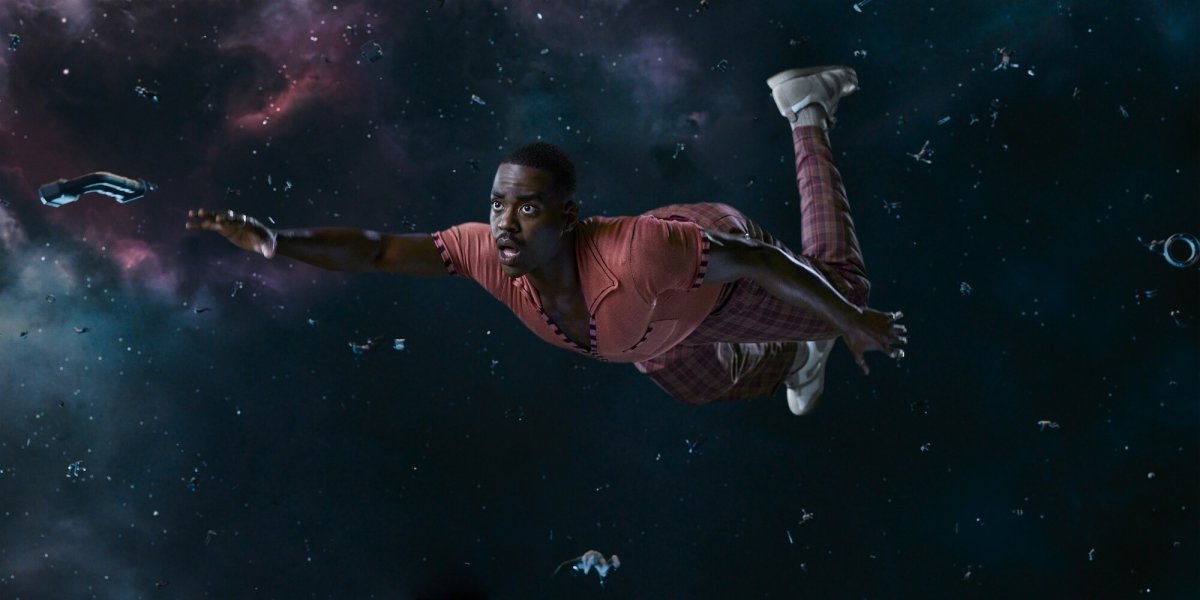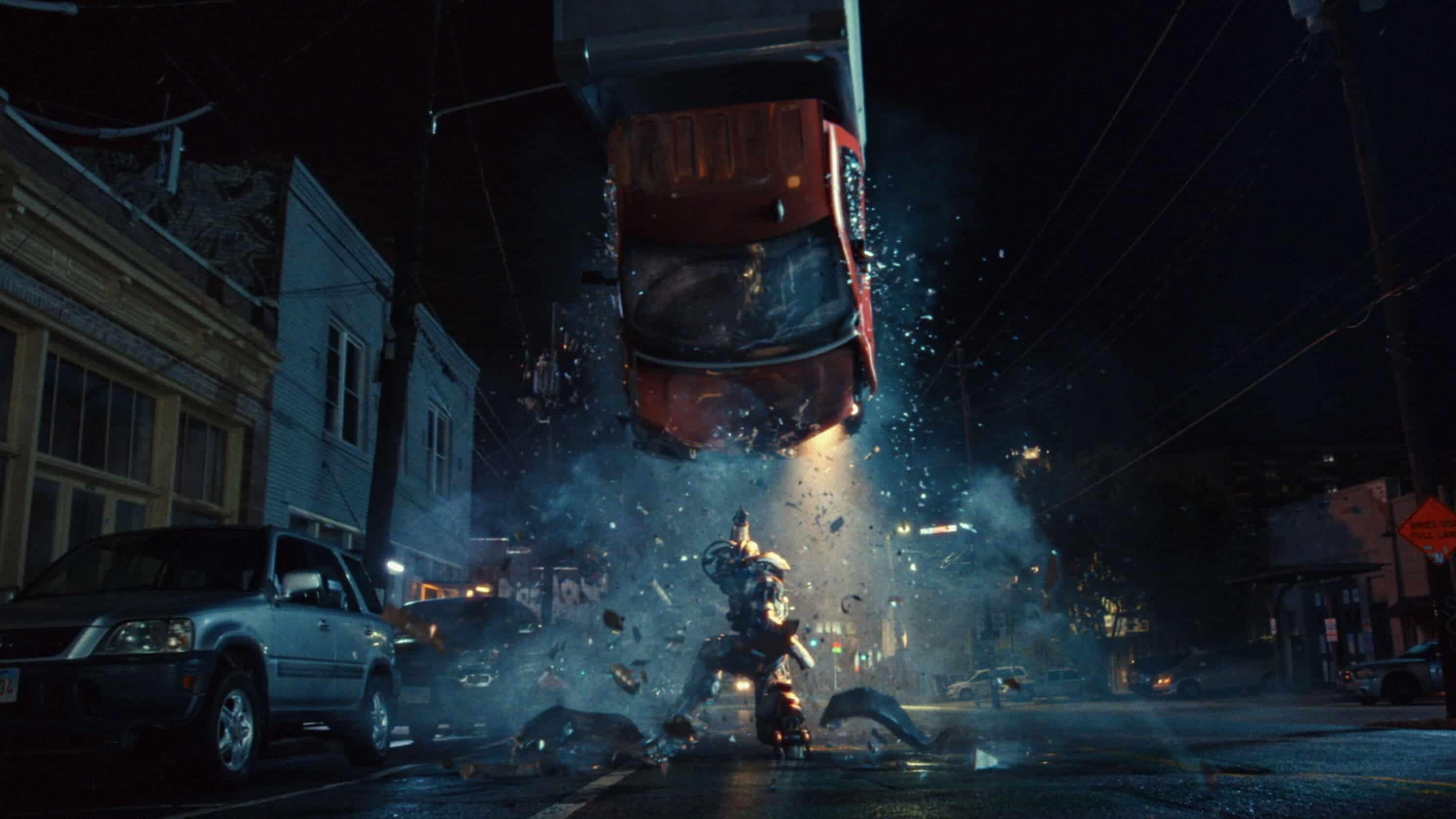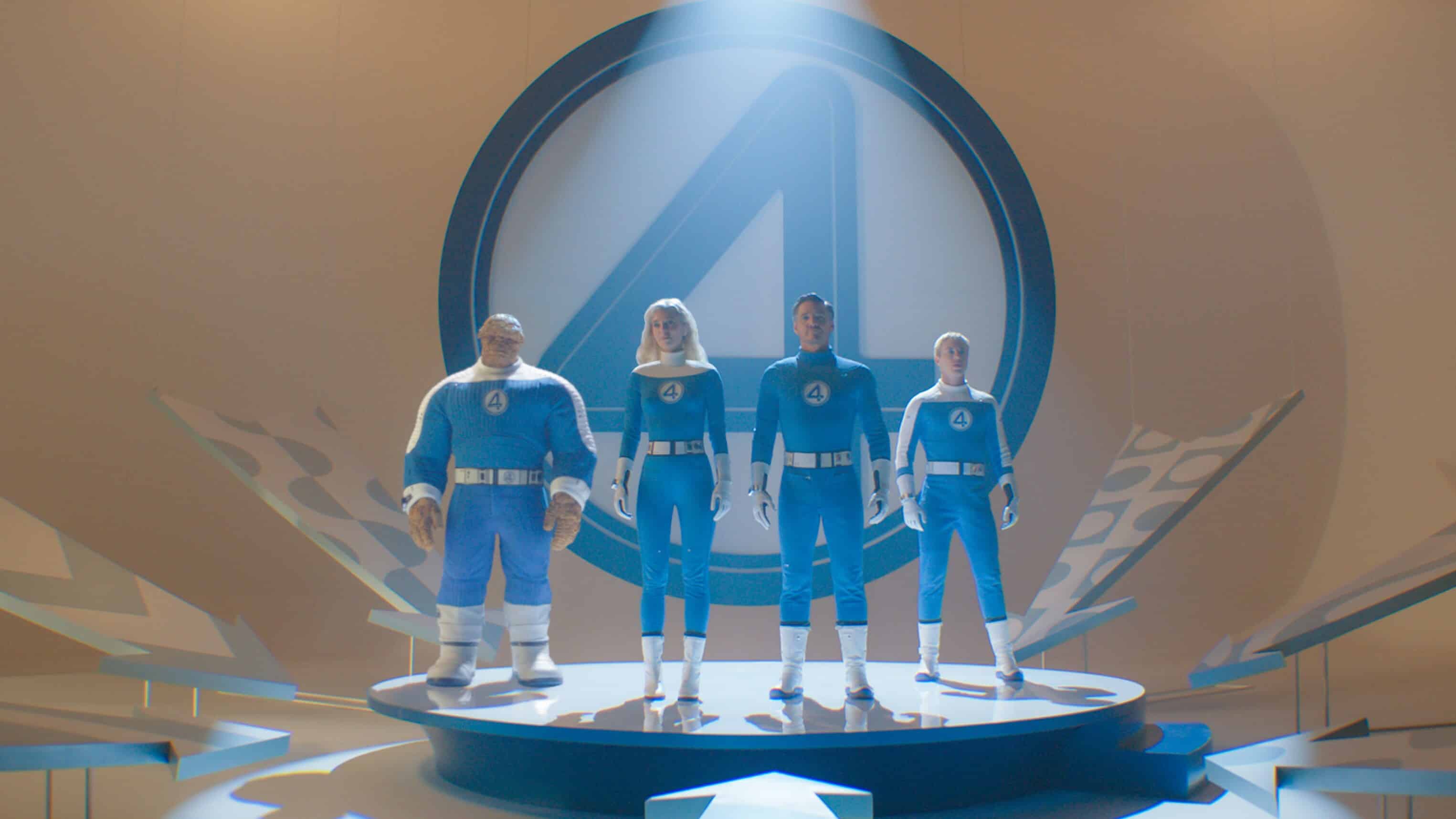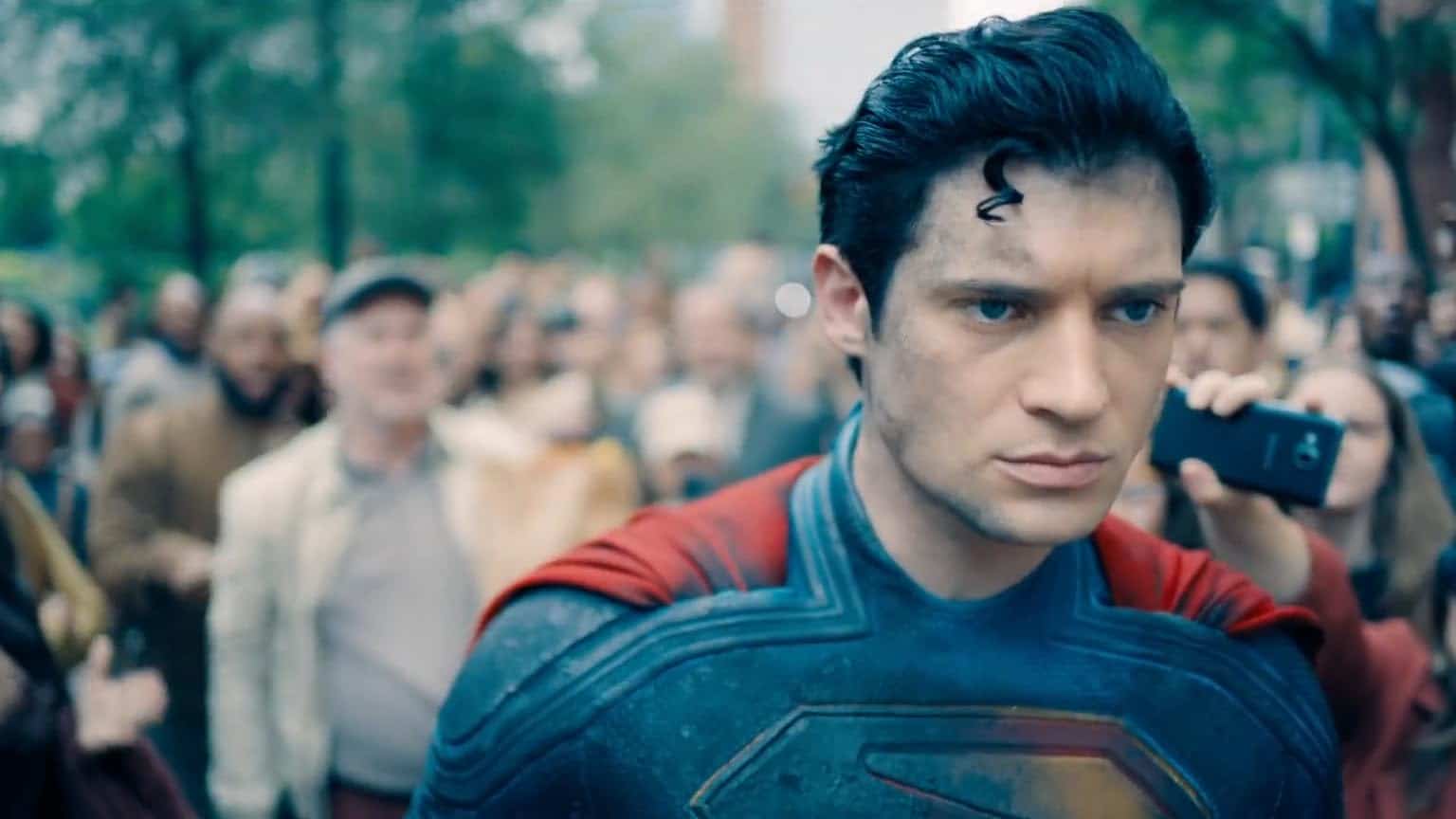Armaan Babu: I skipped watching the Eurovision finale, but it appears that no matter where you hide, Eurovision will find you. This week, on Doctor Who, Eurovision plays out for over 3 trillion fans across the universe. Margot, are you one of those fans?
Margot Waldman: So. Look.
I have never watched Eurovision because Eurovision simply does not interest me. I am very not cis or straight and I know it basically defines the camp and queer for the next European calendar year, but it does not interest me – though of course vast amounts of Euroshit does. I know and like ABBA just fine, of course, but I have nothing for Eurovision proper. Whenever it’s that time of year and my queer British friends bring it up, I sort of act as though I can’t hear anything. I cough and look away – and I’m not sure I’m able to do much more for this episode, because this episode is sort of predicated on whether you are bemused by seeing Rylan Clark standing next to an alien. Personally, I am not.
It’s not even a matter of getting a reference or not – I assure you I am comfortable with not necessarily getting every reference to something. For reasons hopefully known to my therapist, I have just completed reading all of Alan Moore’s League of Extraordinary Gentlemen. But the problem is that the central axis of this episode is feeling that animal shiver of pleasure at Eurovision, because there is just nothing else going on. That’s unfair – there are a couple of interesting scenes and sequences. Blob aliens or weird little bugs singing Eurovision songs in gibberish is fun in a background gag kind of way – but then we have to have a base under siege plot.
Armaan: And that base, this week, is weak. The Doctor and Belinda Chandra, in their quest to gather enough anchor points throughout time and space for them to finally be able to return to May 25, 2025, find themselves at an interstellar version of Eurovision, several centuries in the future. The cryogenically preserved Rylan Clark is unfrozen to host (and let’s spare a moment to consider the horror of that — constantly frozen and unfrozen for an endless series of hosting increasingly extravagant musical competitions with nary a break in between? It sounds exhausting.) while the entire galaxy watches.
There’s a lot of fun that can be had with this premise. What we get, however, is an episode that more or less ticks off a box, taking very little advantage of what could have been a wildly fun episode.
Margot: We get barely enough flavor – the flavor that makes this a fun premise in the first place, the flavor that surely could have gone on for, what, five more minutes? – to make this technically distinct from any other Doctor Who episode. There are so many good alien Eurovision bits you could do as background gags, and we did maybe one half of one joke. Why not a species whose singing is completely inaudible to humans? Or Eurovision by pheromones? Zygon ABBA? The jokes write themselves – but there’s not much here to write about.
Armaan: What you want to be able to say about this episode is that there’s a lot of love shown for Eurovision as a concept, but the love is not there. Camp, celebration, silliness, joy — these are things that the episode nods toward but rarely ever achieves. The camp, bizarre, all-out celebrations of musical performance that make up Eurovision are more subdued here. The few musical performances we get are subdued, forgettable and cast aside the moment there’s another scene to focus on. As you pointed out, Margot, there’s so much potential here for a really fun episode, but there’s not a lot of real fun to be had. That’s before we even get to our villain of the week, a punk tiefling ready to burn the universe down in an utterly selfish act of revenge.
Margot: I’m already forgetting anything I know about the Hellions – they’re, what, cosplayers from the honey planet or something? Even the Doctor doesn’t think the Kid is especially notable except as a symbol of a greater trend – just one of so many denizens of a broken galaxy misusing that brokenness. As we so movingly learned last week, “hurt people hurt people” (this is a joke because what an insipid truism that has become) – and we are never given any shading for the Hellions beyond this.
Armaan: This episode hinges on a huge buy-in — the idea that these horn-headed Hellions are the victims of universal prejudice, but it’s a hard concept to buy into. The Hellions are the most normal looking aliens you can conceive of, their only distinguishing marks being a thin pair of horns sticking out of their heads. A cheap accessory is placed on their heads, and we call it a day. Nothing about them stands out, and everything we learn about their planet reeks of lazy writing. The hard-horned Hellions come from Hellia, where their most valuable resource are Hell poppies. That’s pretty much all we learn about their planet, and their species.
Margot: There have been plenty of meaningful controversies about who should or shouldn’t be allowed in Eurovision – Russia and Israel are frequently cited, and for good reason. I’ve read commentators attempt to link this episode to those weighty issues, but the simple fact is that Juno Dawson’s script cannot make enough of itself for the plot to work as an episode of Doctor Who, let alone as nuanced political commentary about the role popular entertainment plays in legitimizing regimes internationally. It’s a sad truth that the first script for the show by a transgender writer (something I should be absolutely cheering for) just … hasn’t very much to say.
Armaan: I was almost drawn in when we learn more of what the (lazily named) Corporation did — they took as many Hell poppies from Hellia as they could just to flavor their honey, and burned whatever fields were left. After that, they began a universal propaganda campaign labelling the Hellions savages who destroyed their own planet, covering up any damage the Corporation did.
That an entire planet was burned and covered up by besmirching its entire population, for something so arbitrarily small, is a compelling kind of evil — if the episode did any work whatsoever into making it feel real. That’s the challenge of any good sci-fi (or for that matter) fantasy series, that’s what separates good writing from bad — if you can take a ridiculous concept, ground it with a kernel of something real and make it feel believable. The concept is far too thin for it to work, however. We’re only introduced to the Hellions in this episode. The scale is too large. Everyone in the universe believes the lies of a Corporation that calls itself the Corporation? There’s not one of 3 trillion fans who have something to say about how the Hellions were treated, in a setting that clearly has a functioning version of the internet? This Corporation that we’ve barely heard about until now is that successful in spreading their lies across the galaxy?
The Doctor has been travelling across the cosmos for nearly 900 episodes, to say nothing of the various comics, audio dramas, books and specials that all tie in — meaning that if we’re just hearing about a threat, it’s a minor one. It doesn’t have much in the way of narrative weight. Introducing us to something on this scale, it’s hard to buy into. If you do, however, there’s not a lot this episode has to say about its big evil.
Margot: What it has to say is so flat. We are told flatly the “Corporation” (the genericism is meant to imply hegemonic control, but, as you say, it just makes everything feel flat) sponsors the entire contest. Every world is guilty of the exploitation of the Tiefling Honey Planet, and that’s something, but that flatness is reciprocated by the Kid’s plan to flatly kill 7 trillion people. If, say, he was going to hold the stadium hostage because the execs were there, that’s something. But we don’t have enough to hang anything on, not even a coda or a takeaway message.
We see that the thing to do is raise awareness through peaceful means – not exactly always successful in the real world, but it does not mean the deaths of 7 trillion people (this is vastly more people than have ever lived on the planet Earth, to be clear. There are probably fewer than 7 trillion beetles on the planet!), so I suppose I’ll support it. Of course, I don’t know what shaven-horned Cora (shades of Hellboy) was actually singing about, so that puts rather a damper on the whole affair. For all we know it was the Hellion version of “Kokomo” or something.
Armaan: Again, the writing is lazy. Throwing a giant number out there is a lazy way to increase stakes. There are diminishing returns to a threat — someone who plans to kill 100 is not, ultimately, that much more scary or vile than someone who plans to kill several trillions. There are interesting ways to increase stakes. Throwing increasingly larger numbers out there is not the way to do it.
Margot: And the script insists on the number, so I can’t ignore it! But it’s a weak script, too. The rest of the cast is pretty much, well, what you’d expect – quirky couple of tech gurus, a Racist Who Learns Not To Be By The End, a Bedraggled Base-Under-Siege Manager, that sort of thing. Varada Sethu is once again given very little to do, I’m sorry to say – we’re saying goodbye to her without any shading of her characterization much at all. This time, she’s telling the Doctor she thinks he’s just grand – we think so too, or we wouldn’t be watching Doctor Who, probably.
Armaan: The supporting cast is delightful and fun. Forgettably so? Yes, but they’re a pleasant distraction for what this episode counts as dire stakes. They’re an easy win for this episode, and we’ll take our delights where we can get them.
Margot: I was actually interested in the raw violence of the Doctor’s reaction to the baddies – “ice in my heart” indeed! Sadly it doesn’t go much of anywhere. I’d’ve liked it more if we’d have to infer – or perhaps have Belinda infer – why the Doctor was so fucked off about the whole thing. I’d like to hope we as an audience can recognize that the Doctor might be triggered by the concept of genocide.
Armaan: This was what felt off to me, actually. We’ve seen the Doctor go up against so many villains who are more compellingly vile. The Hellions here feel small, despite the scale of their attempted genocide. Their plan is impulsive, short-sighted and not even particularly clever. They are forgettable, and even though the Doctor has a good reason to be triggered, it feels like the moment we first see this Doctor truly lose control should be for a more interesting villain than this.
Margot: It’s scraps, but I’ll take them if we have two episodes left. And all the same, I’m glad we get to see Ncuti Gatwa’s acting chops – I’ve always thought the ability to be a bit monstrous is what defines the best Doctors. For Gatwa, it’s fascinating to see rage outline his joy – to see what makes the Doctor cruel, but also not the Master.
Or, I suppose, the Rani? Yes, that’s right, she’s back and better than ever, as the wonderfully camp Archie Panjabi (coming for Ncuti Gatwa’s crown, I suppose) proves. Frankly, the Rani is a terrible character – part of why her return was such a gag is because there is no conceivable reason to do it other than it being objectively funny. We already had a female Master, anyways. It would be like 2065 seeing the triumphant return of the Pting.
Armaan: I am in the middle of a rewatch of The Good Wife, so seeing Archie Panjabi on the screen again was my favorite part of the episode by a mile. Her outfit being a Doctor-Who-ified version of her look on The Good Wife is just icing on the cake. Am I excited about the character? Not especially, but it’s a fun reveal, nonetheless. Like you said, there’s nothing particularly compelling about the Rani unless you’re a die-hard Doctor Who fan who wants nothing from the show but callbacks to its deepest lore.
Margot: But you know what? It was pretty funny, and if we’re getting canceled or getting dropped by Disney, let’s ride into the sun, I say. Why the hell not? I probably sounded like an Anglophilic hyena when it happened. It’s really nuts, absolutely ridiculous. Her bigeneration, Mrs. Flood, being her fawning, scraping flunkie is quite a lot of fun to watch, too – though I do hope that we see some tension between the two. Two Ranis, too furious, no?
I wish I could say anything very definite about the return of Susan – Carole Ann Ford being back is extremely cool (if perhaps a very deep cut for many people), but we just don’t know anything yet. Except this – because Graham Norton has officially confirmed it. The planet Earth is going to explode next week or so. (I won’t be too surprised, at this point). This was a bust – but I am (maybe ironically?) excited to spend time with the Rani – next time. I hope we get a renewal, but I think the show needs to do a bit more to prove it’s deserved, sadly.







